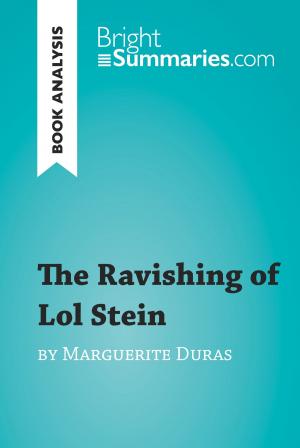The Myth of Sisyphus by Albert Camus (Book Analysis)
Detailed Summary, Analysis and Reading Guide
Nonfiction, Religion & Spirituality, Philosophy, Existentialism, Free Will & Determinism, Reference & Language, Study Aids| Author: | Bright Summaries | ISBN: | 9782806294623 |
| Publisher: | BrightSummaries.com | Publication: | February 26, 2016 |
| Imprint: | BrightSummaries.com | Language: | English |
| Author: | Bright Summaries |
| ISBN: | 9782806294623 |
| Publisher: | BrightSummaries.com |
| Publication: | February 26, 2016 |
| Imprint: | BrightSummaries.com |
| Language: | English |
Unlock the more straightforward side of The Myth of Sisyphus with this concise and insightful summary and analysis!
This engaging summary presents an analysis of The Myth of Sisyphus by Albert Camus, a philosophical essay which focuses on the issue of suicide in an absurd world. Camus uses Greek mythology to highlight why life, in spite of its inherent pointlessness, is still worth living, coming to the conclusion that revolt is the only way to live in such an absurd world. First published in France in 1942, The Myth of Sisyphus is a part of Camus’ cycle of the absurd and can be seen as a companion to The Stranger. Camus himself was born in French Algeria in 1913 and, despite often being liked to Sartre, never identified as an existentialist. He was highly regarded as a prominent absurdist philosopher, and in 1957 won the Nobel Prize in Literature.
Find out everything you need to know about The Myth of Sisyphus in a fraction of the time!
This in-depth and informative reading guide brings you:
• A complete plot summary
• Character studies
• Key themes and symbols
• Questions for further reflection
Why choose BrightSummaries.com?
Available in print and digital format, our publications are designed to accompany you on your reading journey. The clear and concise style makes for easy understanding, providing the perfect opportunity to improve your literary knowledge in no time.
See the very best of literature in a whole new light with BrightSummaries.com!
This engaging summary presents an analysis of The Myth of Sisyphus by Albert Camus, a philosophical essay which focuses on the issue of suicide in an absurd world. Camus uses Greek mythology to highlight why life, in spite of its inherent pointlessness, is still worth living, coming to the conclusion that revolt is the only way to live in such an absurd world. First published in France in 1942, The Myth of Sisyphus is a part of Camus’ cycle of the absurd and can be seen as a companion to The Stranger. Camus himself was born in French Algeria in 1913 and, despite often being liked to Sartre, never identified as an existentialist. He was highly regarded as a prominent absurdist philosopher, and in 1957 won the Nobel Prize in Literature.
Find out everything you need to know about The Myth of Sisyphus in a fraction of the time!
This in-depth and informative reading guide brings you:
• A complete plot summary
• Character studies
• Key themes and symbols
• Questions for further reflection
Why choose BrightSummaries.com?
Available in print and digital format, our publications are designed to accompany you on your reading journey. The clear and concise style makes for easy understanding, providing the perfect opportunity to improve your literary knowledge in no time.
See the very best of literature in a whole new light with BrightSummaries.com!
Unlock the more straightforward side of The Myth of Sisyphus with this concise and insightful summary and analysis!
This engaging summary presents an analysis of The Myth of Sisyphus by Albert Camus, a philosophical essay which focuses on the issue of suicide in an absurd world. Camus uses Greek mythology to highlight why life, in spite of its inherent pointlessness, is still worth living, coming to the conclusion that revolt is the only way to live in such an absurd world. First published in France in 1942, The Myth of Sisyphus is a part of Camus’ cycle of the absurd and can be seen as a companion to The Stranger. Camus himself was born in French Algeria in 1913 and, despite often being liked to Sartre, never identified as an existentialist. He was highly regarded as a prominent absurdist philosopher, and in 1957 won the Nobel Prize in Literature.
Find out everything you need to know about The Myth of Sisyphus in a fraction of the time!
This in-depth and informative reading guide brings you:
• A complete plot summary
• Character studies
• Key themes and symbols
• Questions for further reflection
Why choose BrightSummaries.com?
Available in print and digital format, our publications are designed to accompany you on your reading journey. The clear and concise style makes for easy understanding, providing the perfect opportunity to improve your literary knowledge in no time.
See the very best of literature in a whole new light with BrightSummaries.com!
This engaging summary presents an analysis of The Myth of Sisyphus by Albert Camus, a philosophical essay which focuses on the issue of suicide in an absurd world. Camus uses Greek mythology to highlight why life, in spite of its inherent pointlessness, is still worth living, coming to the conclusion that revolt is the only way to live in such an absurd world. First published in France in 1942, The Myth of Sisyphus is a part of Camus’ cycle of the absurd and can be seen as a companion to The Stranger. Camus himself was born in French Algeria in 1913 and, despite often being liked to Sartre, never identified as an existentialist. He was highly regarded as a prominent absurdist philosopher, and in 1957 won the Nobel Prize in Literature.
Find out everything you need to know about The Myth of Sisyphus in a fraction of the time!
This in-depth and informative reading guide brings you:
• A complete plot summary
• Character studies
• Key themes and symbols
• Questions for further reflection
Why choose BrightSummaries.com?
Available in print and digital format, our publications are designed to accompany you on your reading journey. The clear and concise style makes for easy understanding, providing the perfect opportunity to improve your literary knowledge in no time.
See the very best of literature in a whole new light with BrightSummaries.com!















